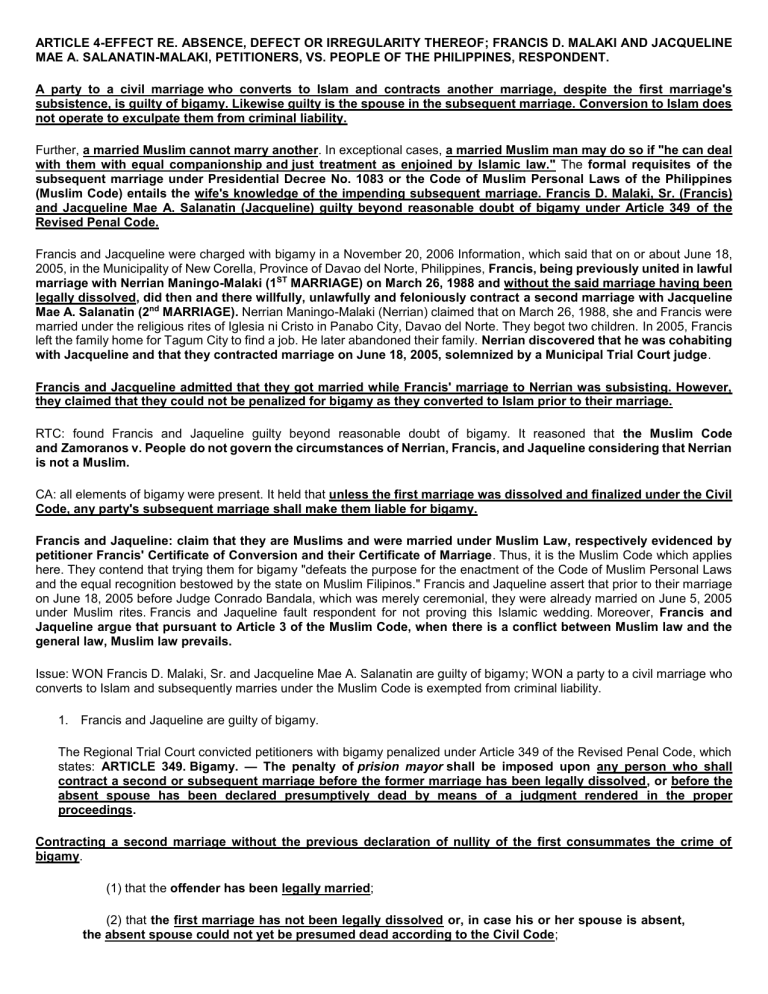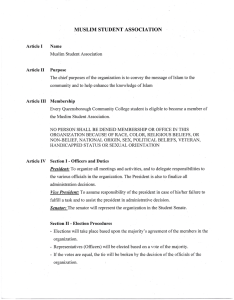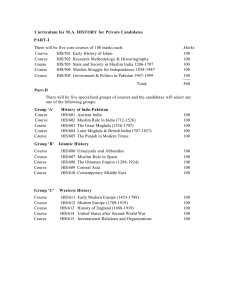Uploaded by
Danielle Kaye Turija
Bigamy Case: Malaki vs. Philippines - Muslim Law Conflict
advertisement

ARTICLE 4-EFFECT RE. ABSENCE, DEFECT OR IRREGULARITY THEREOF; FRANCIS D. MALAKI AND JACQUELINE MAE A. SALANATIN-MALAKI, PETITIONERS, VS. PEOPLE OF THE PHILIPPINES, RESPONDENT. A party to a civil marriage who converts to Islam and contracts another marriage, despite the first marriage's subsistence, is guilty of bigamy. Likewise guilty is the spouse in the subsequent marriage. Conversion to Islam does not operate to exculpate them from criminal liability. Further, a married Muslim cannot marry another. In exceptional cases, a married Muslim man may do so if "he can deal with them with equal companionship and just treatment as enjoined by Islamic law." The formal requisites of the subsequent marriage under Presidential Decree No. 1083 or the Code of Muslim Personal Laws of the Philippines (Muslim Code) entails the wife's knowledge of the impending subsequent marriage. Francis D. Malaki, Sr. (Francis) and Jacqueline Mae A. Salanatin (Jacqueline) guilty beyond reasonable doubt of bigamy under Article 349 of the Revised Penal Code. Francis and Jacqueline were charged with bigamy in a November 20, 2006 Information, which said that on or about June 18, 2005, in the Municipality of New Corella, Province of Davao del Norte, Philippines, Francis, being previously united in lawful marriage with Nerrian Maningo-Malaki (1ST MARRIAGE) on March 26, 1988 and without the said marriage having been legally dissolved, did then and there willfully, unlawfully and feloniously contract a second marriage with Jacqueline Mae A. Salanatin (2nd MARRIAGE). Nerrian Maningo-Malaki (Nerrian) claimed that on March 26, 1988, she and Francis were married under the religious rites of Iglesia ni Cristo in Panabo City, Davao del Norte. They begot two children. In 2005, Francis left the family home for Tagum City to find a job. He later abandoned their family. Nerrian discovered that he was cohabiting with Jacqueline and that they contracted marriage on June 18, 2005, solemnized by a Municipal Trial Court judge. Francis and Jacqueline admitted that they got married while Francis' marriage to Nerrian was subsisting. However, they claimed that they could not be penalized for bigamy as they converted to Islam prior to their marriage. RTC: found Francis and Jaqueline guilty beyond reasonable doubt of bigamy. It reasoned that the Muslim Code and Zamoranos v. People do not govern the circumstances of Nerrian, Francis, and Jaqueline considering that Nerrian is not a Muslim. CA: all elements of bigamy were present. It held that unless the first marriage was dissolved and finalized under the Civil Code, any party's subsequent marriage shall make them liable for bigamy. Francis and Jaqueline: claim that they are Muslims and were married under Muslim Law, respectively evidenced by petitioner Francis' Certificate of Conversion and their Certificate of Marriage. Thus, it is the Muslim Code which applies here. They contend that trying them for bigamy "defeats the purpose for the enactment of the Code of Muslim Personal Laws and the equal recognition bestowed by the state on Muslim Filipinos." Francis and Jaqueline assert that prior to their marriage on June 18, 2005 before Judge Conrado Bandala, which was merely ceremonial, they were already married on June 5, 2005 under Muslim rites. Francis and Jaqueline fault respondent for not proving this Islamic wedding. Moreover, Francis and Jaqueline argue that pursuant to Article 3 of the Muslim Code, when there is a conflict between Muslim law and the general law, Muslim law prevails. Issue: WON Francis D. Malaki, Sr. and Jacqueline Mae A. Salanatin are guilty of bigamy; WON a party to a civil marriage who converts to Islam and subsequently marries under the Muslim Code is exempted from criminal liability. 1. Francis and Jaqueline are guilty of bigamy. The Regional Trial Court convicted petitioners with bigamy penalized under Article 349 of the Revised Penal Code, which states: ARTICLE 349. Bigamy. — The penalty of prision mayor shall be imposed upon any person who shall contract a second or subsequent marriage before the former marriage has been legally dissolved, or before the absent spouse has been declared presumptively dead by means of a judgment rendered in the proper proceedings. Contracting a second marriage without the previous declaration of nullity of the first consummates the crime of bigamy. (1) that the offender has been legally married; (2) that the first marriage has not been legally dissolved or, in case his or her spouse is absent, the absent spouse could not yet be presumed dead according to the Civil Code; (3) that he contracts a second or subsequent marriage; and (4) that the second or subsequent marriage has all the essential requisites for validity. Francis and Jaqueline admit that Francis was legally married to Nerrian and that the marriage was not dissolved. They likewise admit that they subsequently married despite the subsistence of Francis' marriage to Nerrian. These admissions sufficiently establish all the elements of bigamy which prove Francis and Jaqueline’s guilt beyond reasonable doubt. However, they claim that they both converted to Islam and were married under Muslim rites. They contend that Muslims may subsequently marry and this exculpates them from criminal liability. 2. Whether Francis converted to Islam before or after his marriage with Jacqueline, the subsequent marriage consummated the crime of bigamy. He cannot successfully invoke the exculpatory clause in Article 180, considering that the Muslim Code finds no application in his then subsisting marriage with Nerrian, the marriage recognized by law that bars and penalizes a subsequent marriage. Article XV, Section 11 of the 1973 Constitution provides that, "[t]he State shall consider the customs, traditions, beliefs and interests of national cultural communities in the formulation and implementation of state policies." Similar policy was enunciated in Article II, Section 22 and Article XIV, Section 17 of the 1987 Constitution: ARTICLE II SECTION 22. The State recognizes and promotes the rights of indigenous cultural communities within the framework of national unity and development. ARTICLE XIV SECTION 17. The State shall recognize, respect, and protect the rights of indigenous cultural communities to preserve and develop their cultures, traditions, and institutions. It shall consider these rights in the formulation of national plans and policies. The Muslim Code was promulgated on February 4, 1977 and took effect on May 16, 1977. Article 2 outlined its purposes: (a) Recognizes the legal system of the Muslims in the Philippines as part of the law of the land and seeks to make Islamic institutions more effective; (b) Codifies Muslim personal laws; and (c) Provides for an effective administration and enforcement of Muslim personal laws among Muslims. The Muslim Code codifies previously acknowledged personal laws which Moros have observed since time immemorial. It recognizes Islamic institutions and legal systems of marriage, divorce, inheritance, and other aspects of family relations. It established shari'a courts for the implementation of Muslim personal laws. While called shari'a courts in our jurisdiction, they primarily interpret personal and family laws only, which is but one aspect of shari'a. The applicability provisions in the Muslim Code are: ARTICLE 3. Conflict of provisions. – (1) In case of conflict between any provision of this Code and laws of general application, the former shall prevail. (2) Should the conflict be between any provision of this Code and special laws or laws of local application, the latter shall be liberally construed in order to carry out the former. (3) The provisions of this Code shall be applicable only to Muslims and nothing herein shall be construed to operate to the prejudice of a non-Muslim. ARTICLE 13. Application. — (1) The provisions of this Title shall apply to marriage and divorce wherein both parties are Muslims, or wherein only the male party is a Muslim and the marriage is solemnized in accordance with Muslim law or this Code in any part of the Philippines. (2) In case of marriage between a Muslim and a non-Muslim, solemnized not in accordance with Muslim law or this Code, the Civil Code of the Philippines shall apply. ARTICLE 178. Effect of conversion to Islam on marriage. — The conversion of non-Muslim spouses to Islam shall have the legal effect of ratifying their marriage as if the same had been performed in accordance with the provisions of this Code or Muslim law, provided that there is no legal impediment to the marriage under Muslim law. ARTICLE 179. Effect of change of religion. — The change of religion by a Muslim shall not have the effect of extinguishing any obligation or liability whatsoever incurred prior to said change. ARTICLE 180. Law applicable. — The provisions of the Revised Penal Code relative to the crime of bigamy shall not apply to a person married in accordance with the provisions of this Code or, before its effectivity, under Muslim law. ARTICLE 186. Effect of code on past acts. — (1) Acts executed prior to the effectivity of this Code shall be governed by the laws in force at the time of their execution, and nothing herein except as otherwise specifically provided, shall affect their validity or legality or operate to extinguish any right acquired or liability incurred thereby. (2) A marriage contracted by a Muslim male prior to the effectivity of this Code in accordance with non-Muslim law shall be considered as one contracted under Muslim law provided the spouses register their mutual desire to this effect. ARTICLE 187. Applicability Clause. — The Civil Code of the Philippines, the Rules of Court and other existing laws, insofar as they are not inconsistent with the provisions of this Code, shall be applied suppletorily. The Muslim Code applies to marriages, their nature, consequences, and incidents between fellow Muslims, between a male Muslim and a non-Muslim solemnized in Muslim rites, between spouses who both converted to Islam after their marriage, and between a male Muslim and a non-Muslim entered into prior to the Code's effectivity. It also penalizes specific offenses relative to marriages. The general law, the Civil Code (superseded by the Family Code), governs marriages not solemnized under Muslim rites, including those between a Muslim and a non-Muslim. Crimes and offenses in connection with civil marriages are defined in the Revised Penal Code and special laws. The Muslim Code allows subsequent marriages on certain conditions. The ponente maintains his views on the separation of Church and State. However, the reality is that the Muslim Code merely codified previously acknowledged customs which Moros have observed since time immemorial. Consequently, when married in accordance with the Muslim Code's provisions or under the Muslim law before the Muslim Code's effectivity, a male Muslim shall not be indicted for bigamy when he subsequently marries, as provided in Article 180 of the Muslim Code. Article 3 of the Muslim Code declares that its provisions shall not be construed to the prejudice of a nonMuslim. Certainly, granting the Muslim convert, like Francis, the recourse provided in Article 180 would be prejudicial to the abandoned wife, and the state, the aggrieved party in criminal prosecutions. Moreover, Article 186 of the Muslim Code directs its prospective application on past acts, and that nothing "shall affect their validity or legality or operate to extinguish any right acquired or liability incurred thereby[,]" except as otherwise specifically provided. Acts done prior to the effectivity of the Muslim Code remain governed by the Civil Code, the then pre-existing law of general application. Similarly, any protection which the Muslim Code may afford petitioner Francis when he converted to Islam – which is when the Muslim Code became applicable to him – must also be prospectively applied. Indeed, in case of conflict with a general law, the Muslim Code prevails. However, Article 13(2) of the Muslim Code explicitly spells out that the Civil Code governs marriages where either party is non-Muslim and which were not solemnized in Muslim rites. There is no conflict with general law here. The nature, consequences, and incidents of petitioner Francis' prior and admittedly subsisting marriage to Nerrian remain well-within the ambit of the Civil Code, and its counterpart penal provisions in the Revised Penal Code. 3. Article 27 of the Muslim Code conditionally allows the Muslim husband's subsequent marriage in exceptional cases. The substantive requisites are: Notwithstanding the rule of Islamic law permitting a Muslim to have more than one wife but not more than four at a time, no Muslim male can have more than one wife unless he can deal with them with equal companionship and just treatment as enjoined by Islamic law and only in exceptional cases. (Emphasis supplied) The general rule is that a married Muslim cannot marry another. However, in exceptional cases, the male Muslim may do so if "he can deal with them with equal companionship and just treatment as enjoined by Islamic law." CONSENT OF THE FIRST WIFE: Article 162 spells out the formal requisites for the Muslim husband's subsequent marriage: Any Muslim husband desiring to contract a subsequent marriage shall, before so doing, file a written notice thereof with the Clerk of Court of the Shari'a Circuit Court of the place where his family resides. Upon receipt of said notice, the Clerk shall serve a copy thereof to the wife or wives. Should any of them object, an Agama Arbitration Council shall be constituted in accordance with the provisions of paragraph (2) of the preceding article. If the Agama Arbitration Council fails to obtain the wife's consent to the proposed marriage, the Court shall, subject to Article 27, decide whether or not to sustain her objection. The Muslim husband must first notify the Shari'a Circuit Court, where his family resides, of his intent to contract a subsequent marriage. The clerk of court shall then serve a copy to the wife or wives. If any of them objects, the Muslim Code mandates the constitution of the Agama Arbitration Council, which shall hear the wife. Ultimately, the Shari'a Circuit Court decides whether to sustain the wife's objection. "In other words, the consent of the wife, or the permission of the Shari'a Circuit Court if the wife refuses to give consent, is a condition sine qua non with respect to the subsequent marriage."67 Absent the wife's consent or the court's permission, the exculpatory provision of Article 180 shall not apply, since it only exempts from the charge of bigamy a Muslim husband who subsequently marries "in accordance with the provisions of [the Muslim Code]."68 The wife's knowledge of the impending subsequent marriage is essential and may not be waived: The lack of knowledge of the wife from the prior subsisting marriage does not only deprive her of the opportunity to consent or object, but also prevents the Shari'a Circuit Court from ruling on any objection. The subsequent marriage therefore fails to satisfy the requirement of prior consent or permission under Article 162.69 .... The subsequent marriage in the contemporary practice is not contracted in accordance with the Muslim Code or Muslim Law. Article 349 of the Revised Penal Code may validly regulate such subsequent marriage.70 (Citation omitted) Moreover, failure to comply with the statutory requirements under the Muslim Code shall be punished by arresto mayor or a fine. The Muslim Code classifies marriages with infirmities into batil (void) and fasid (irregular). However, there is no provision on the status of a male Muslim's subsequent marriage which failed to comply with the formal requisites laid down in Article 162. Renowned shari'a jurists Justice Jainal Rasul74 and Judge Bensaudi I. Arabani, Sr.75 opine that it is bigamous. As a bigamous marriage, it is declared as void from the beginning by the Family Code,76 and penalized under the Revised Penal Code. In any case, even granting that the parties' circumstances fell exclusively within the coverage of the Muslim Code, noncompliance with the condition precedent to subsequent marriages belies petitioners' good faith and manifests their intent to circumvent the law. The Court of Appeals found that: Francis did not comply with the requisites provided, and even testified that he does not know that such is required, as he declared in open court that he only knew he can remarry. The failure of Francis to comply with the requisites betrays his invocation of Islamic law as an excuse for his indiscretion.77 (Emphasis supplied) Francis’ apparent nonchalance in complying with the Muslim Code is an evidentiary matter where the Regional Trial Court and the Court of Appeals' findings are in complete harmony. Factual matters are not the province of the present Petition. Absent any showing that they are grossly in error, the findings of the Regional Trial Court and the Court of Appeals stand undisturbed. 4. Conversion to Islam to remarry and circumvent the laws on bigamy generates legal tensions as it exploits the protective mantle of religious freedom under the Constitution. To this day, the Philippines outlaws divorce for its non-Muslim majority. A contemporary practice in the Philippines has been observed, where males convert to Islam as their alternative to divorce.78 A website79 offering visa services to immigrants to the United States touted: The Philippines is the only country other than the Vatican that outlaws divorce. That's why it's no surprise that so many of our customers are surprised to find out that their Filipina fianc[é] cannot qualify for a K1 fianc[é] visa and be with them in the United States due to a previous unresolved marriage. While she may be living completely separated from the first husband for many years, under the eyes of the law, she's still married. There is one exception that some may think is a viable loophole – "Convert to Islam and be able to legally divorce. " Unfortunately for them, it's not that simple. According to Presidential Decree No. 1083, there are divorces allowed in very specific circumstances under Shari'a District Court, subject to the provisions of the Rules of Court. But in terms of obtaining a U.S. visa, bear in mind that it's a U.S. issue, and the consular officer still has the final say.80 (Emphasis supplied) This illegal practice where they convert to Islam solely to remarry eludes proper documentation and was described in this manner: Males that have subsisting valid marriages under Civil Law purposely convert to Islamic faith with the sole intention of contracting another marriage that is legally recognized. The contemporary practice capitalizes on the permissibility of polygamy in Islam, whereby the act of conversion to Islamic faith capacitates the male to contract a subsequent marriage. The contemporary practice is characterized by two overriding objectives on the part of the male. First, the male aspires to possess the capacity to remarry without any legal impediment and liability. Second, the male seeks to contract another marriage that is legally recognized. Islamic conversion proves to be a viable means of achieving these overriding objectives. It is critical to underscore the dearth of published reports concerning the contemporary practice. By its very nature, the reason for the lack of reports is readily apparent—the practice is carried out with a considerable degree of secrecy to mask the real intentions of the male converting to Islam.81 V Nollora v. People, People v. Ong, and Sayson v. People, affirmed appellants' conviction for bigamy on defenses invoking Article 180 of the Muslim Code or the parties' religion. These cases involved similar facts with the case at hand. The male party to a subsisting civil marriage converted to Islam and subsequently married another woman. On charges of bigamy, appellants invoked Article 180 of the Muslim Code, countering that Muslims may not be indicted of the crime. This Court rules in the same manner and maintains its stance. Sayson echoed Nollora in ruling that "a Muslim man who shall knowingly contract a subsequent marriage without complying with the conditions set forth under [the Muslim Code] . . . cannot claim exemption from liability for the crime of [b]igamy."86 Ong also ruled the same.87 None of the cases which petitioners cited apply here. Sulu Islamic Association of Masjid Lambayong v. Judge Malik88 involved an administrative complaint for immorality and nepotism against Judge Malik who admitted having two wives. This Court held that he was not immoral considering that he is a Muslim, and shari'a conditionally permits polygamy. This Court acknowledged that his first wife consented to the subsequent marriage, and has no ill feelings about it. His first wife stated that Judge Malik did not neglect his duties to his children. Zamoranos89 neither applies. Zamoranos, a Muslim, was exculpated from bigamy since she was previously divorced from her first husband, who is also a Muslim. This Court upheld the finding that there was a valid divorce which allowed her to marry Pacasum.90 The circumstances surrounding Zamoranos are completely different from this Petition, as it involved marriages between Muslims. Artadi-Bondagjy v. Bondagjy must be revisited when a proper case calls for it. There, petitioner converted to Islam and married a fellow Muslim under Muslim rites. She reverted to Catholicism upon her separation from her husband. In granting her custody of their children – which is merely incidental to the couple's separation – this Court applied the Family Code, ruling that the Muslim Code no longer governed since petitioner converted back to Catholicism. This appears to be anomalous. It is inconsistent with how the Muslim Code governs the nature, consequences, and incidents of Muslim marriages and divorce.92 In contracts of marriage, the applicable law is that which governs at the time of marriage, and is not dependent on petitioner's religion at the time of filing the suit. All told, the SC affirms the Court of Appeals' ruling that petitioners are guilty of bigamy under Article 349 of the Revised Penal Code. The penalty is, however, modified. Petitioners are each sentenced to an indeterminate penalty of two years and four months of prisión correccional as minimum to eight years and one day of prisión mayor as maximum. Our pluralist society recognizes that legal institutions may not be subsumed in a homogenous legal system. We enact laws to "preserve and develop [the] cultures, traditions and institutions"93 of indigenous cultural communities and religious minority which come from various sources. Concomitantly, we enabled a system where these laws co-exist and simultaneously operate.94 However, this Court should not condone practices which circumvent laws in the guise of preserving culture. Petitioners Francis D. Malaki, Sr. and Jacqueline Mae A. Salanatin are guilty beyond reasonable doubt of bigamy in Criminal Case No. 15432 and are each sentenced to suffer the penalty of imprisonment of two years and four months of prisión correccional as minimum to eight years and one day of prisión mayor as maximum. SO ORDERED.






